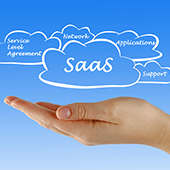 Almost every business relies on software to operate, and for most SMBs, the costs of software — including license and maintenance — are painfully expensive. So is there a solution that allows you to leverage the power of software without a high price tag? One candidate is the software delivery service called SaaS. Read on to learn more about it.
Almost every business relies on software to operate, and for most SMBs, the costs of software — including license and maintenance — are painfully expensive. So is there a solution that allows you to leverage the power of software without a high price tag? One candidate is the software delivery service called SaaS. Read on to learn more about it.
What is SaaS and what makes it appealing?
Software as a Service (SaaS) is a software delivery model that allows you, as a user, to access software from any device via the internet. This gives you more flexibility since you won’t have to come to the office to use the software, but will be able to work from anywhere that has an internet connection.
As opposed to a traditional on-premises setup where software is stored locally, SaaS software is hosted in the cloud, eliminating the need to buy new hardware or spend money on its maintenance. Besides, by transferring software hosting to a third party, you’re also outsourcing all the responsibilities that come with maintenance such as upgrades and troubleshooting.
Another aspect that sets SaaS apart from using on-premises software is licensing. With on-premises, you purchase a license and pay yearly support fees; while with SaaS, you pay a monthly or annual subscription fee that covers licenses, support, and other fees. This is advantageous since it allows you to spread out costs over time, instead of purchasing licenses outright.
Will my data be safe?
One of the issues that makes companies reluctant to switch to SaaS is data security. Who will own my data? Will my data be safe? What if the vendor goes out of business?
First of all, when you’re outsourcing your software to a SaaS vendor, you have to sign a service level agreement (SLA). Make sure that the SLA specifies that you own the data and that the vendor is obliged to provide access to your data even if they go bankrupt.
Secondly, it’s likely that data hosted by your SaaS vendor will be more secure than when it’s stored on your average SMB’s network. That’s because SaaS vendors have to undergo strict security audits, forcing them to invest more in security, backup technology, and maintenance than a typical SMB has to.
Should I switch to SaaS or stick to on-premises?
SaaS is an ideal solution for small- and medium-sized businesses with straightforward business models that are looking for a way to reduce upfront costs. But if your business is large or has complex business processes, a traditional on-premises solution might be a better choice since it offers more functionality and allows for full customization.
Still unsure about whether SaaS is the right answer for your organization? Want to know more about SaaS before making the transition? Call us today. Our experts are ready to answer any questions you may have about SaaS!